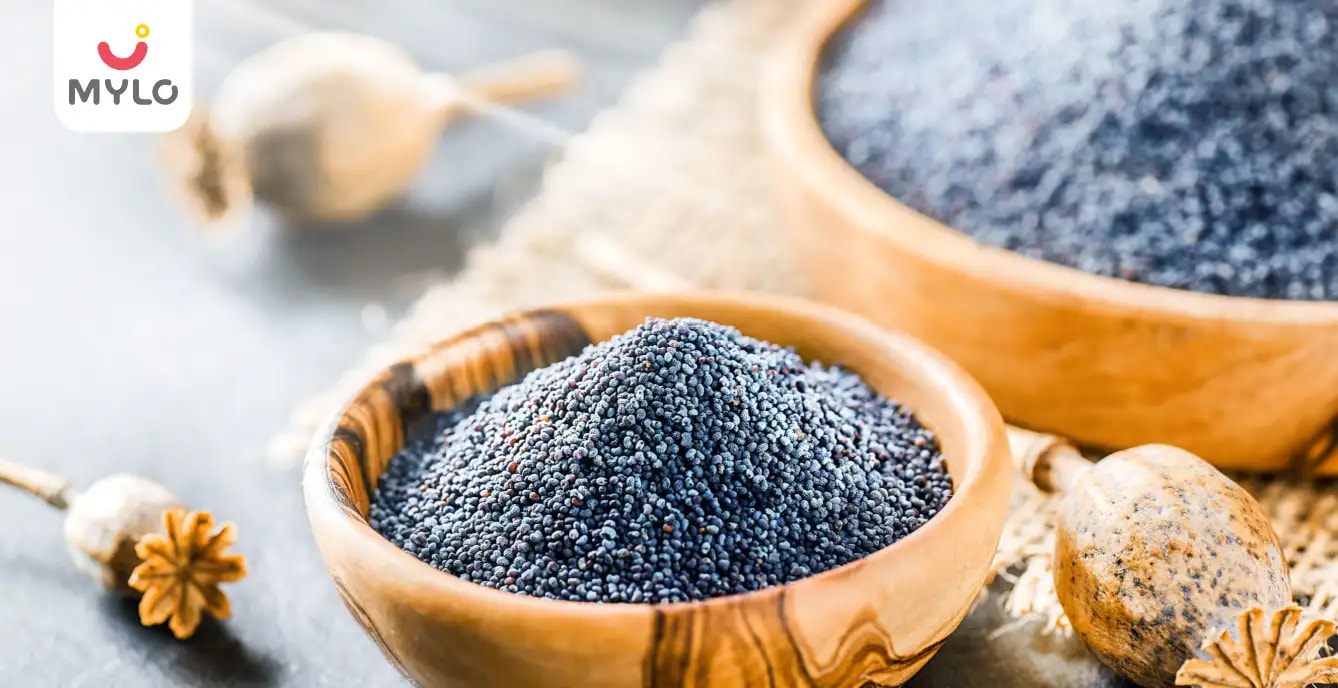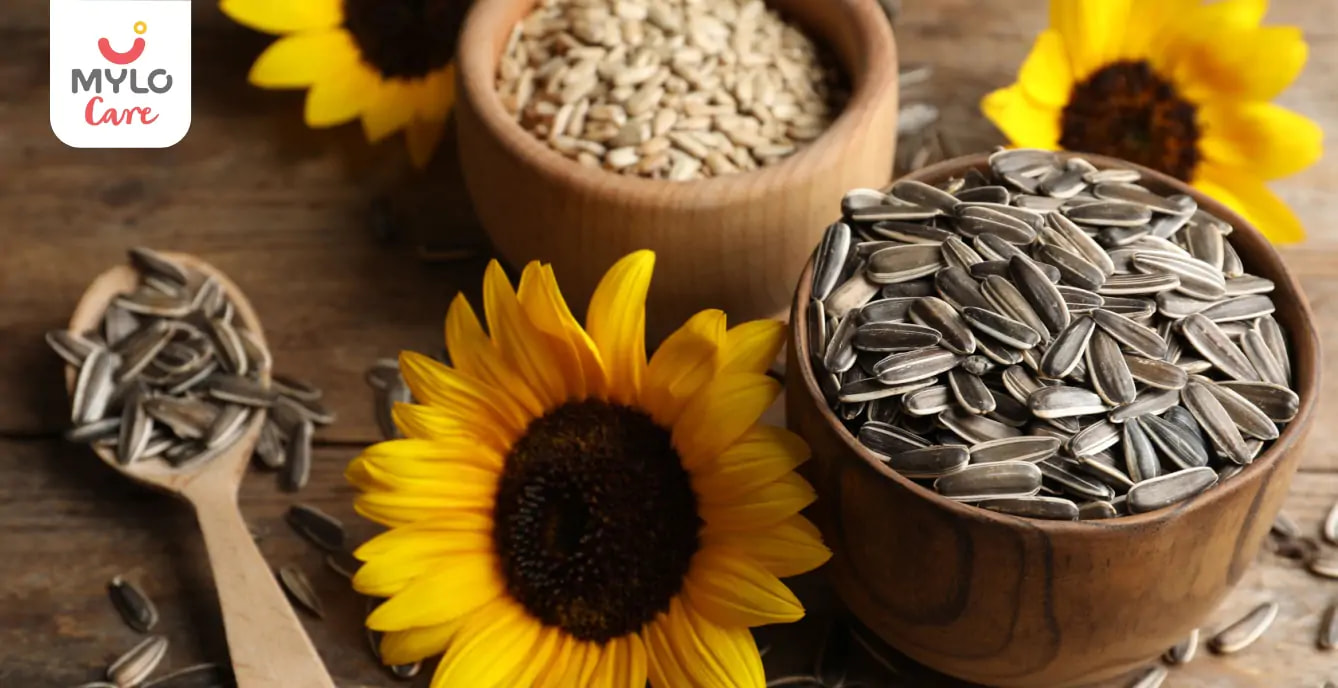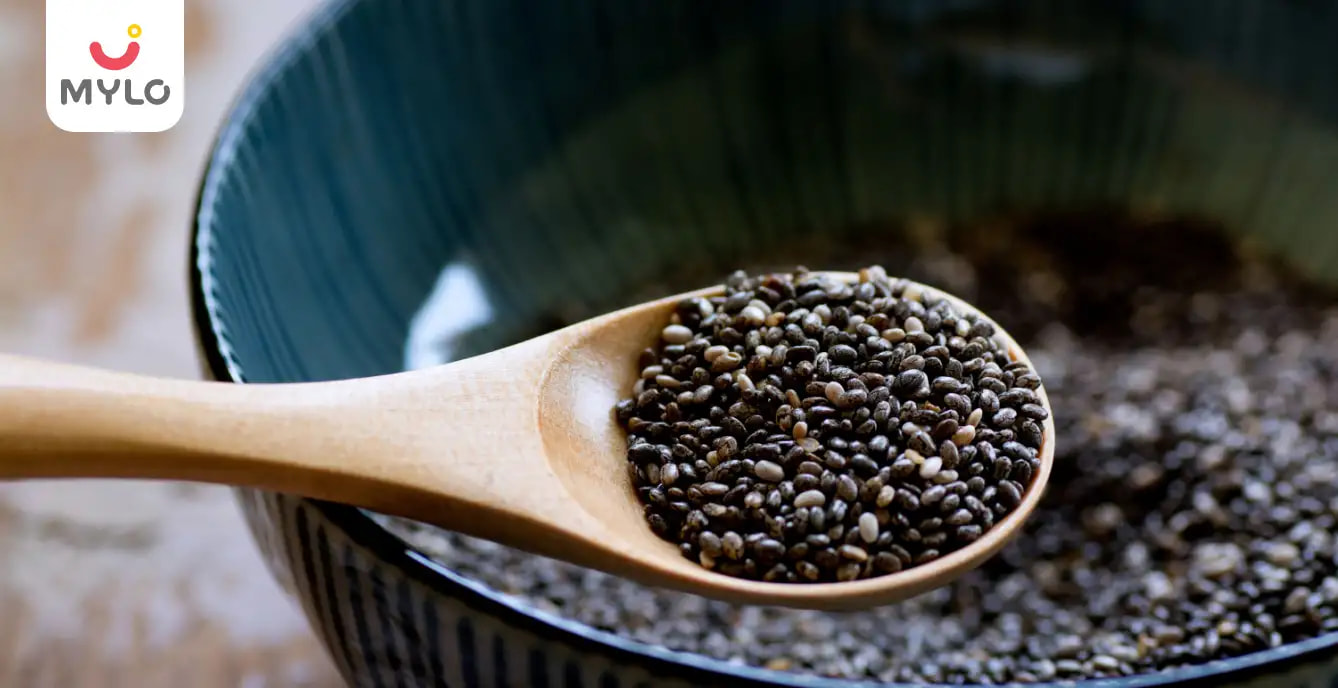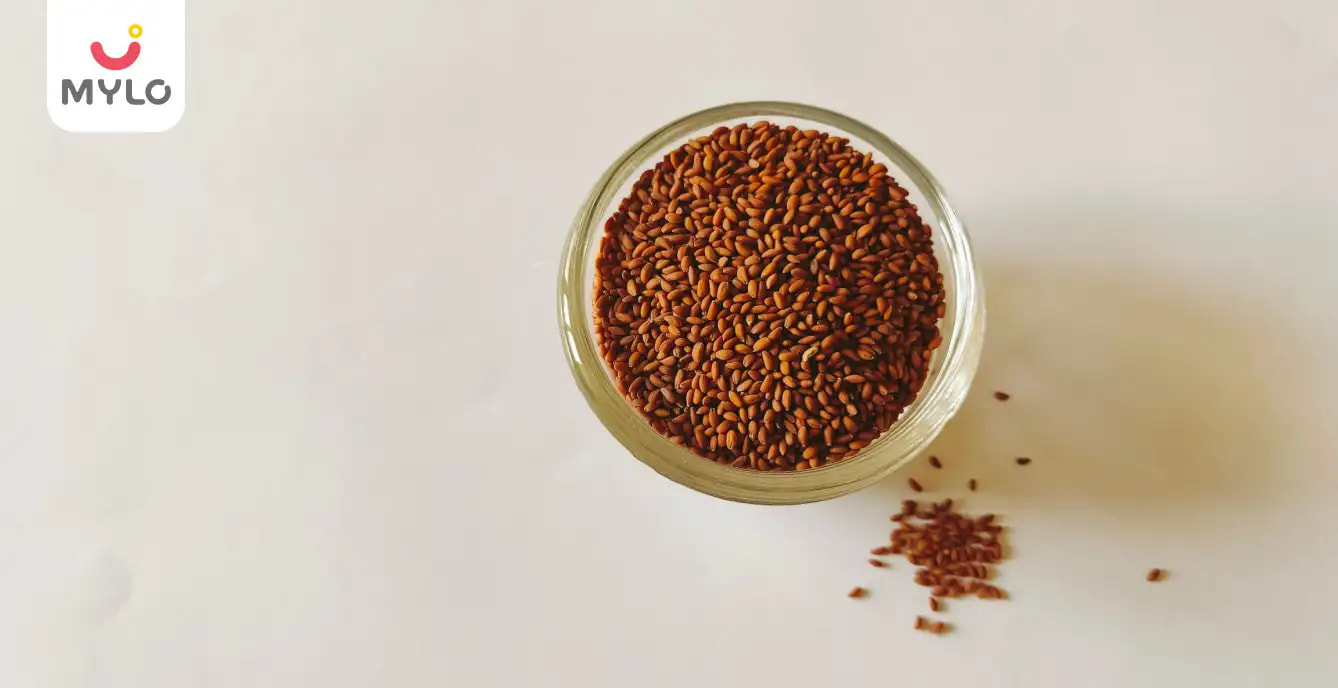Home

Diet & Nutrition

Poppy Seeds During Pregnancy: The Dos and Don'ts You Must Know
In this Article

Diet & Nutrition
Poppy Seeds During Pregnancy: The Dos and Don'ts You Must Know
Updated on 3 November 2023
As you prepare for the arrival of your little bundle of joy, there are certain dos and don'ts that you need to keep in mind, especially when it comes to your diet. One of the most common questions that expectant mothers ask is whether it is safe to consume poppy seeds during pregnancy. While poppy seeds are a popular ingredient in many cuisines and baked goods, they have been a topic of debate when it comes to their safety for pregnant women.
In this article, we answer the burning question "can you have poppy seeds while pregnant", so that you can make an informed decision and enjoy your pregnancy journey to the fullest.
What are poppy seeds?
Poppy seeds are derived from the poppy plant, which is scientifically known as Papaver somniferum. They are a naturally derived product that is commonly used in food and manufacturing. Foods including cakes, pastries, fillings, glazes, and porridges all use poppy seeds. Poppy-seed oil is a crucial ingredient in paints, varnishes, and detergents.
Foods that contain poppy seeds
Some of the food items that contain poppy seeds are:
- Puffed grain pretzels
- Salad dressings
- Bagels
- Bread loaves Rolls
- Cakes/Muffins
- Orange poppyseed cake
- Vegetable sauces
- Pistachio pies
- Puddings made with a poppy seed filling
- Babka, a traditional Jewish treat, was once made using trail mix.
Are poppy seeds safe during pregnancy?
Yes, poppy seeds are safe to consume during pregnancy, but they should be consumed in moderation. Although they are rich in protein, omega-3 fatty acids, fiber, magnesium, calcium, and vitamins B, and have antioxidant properties, consuming large amounts of poppy seeds can cause complications for the baby due to the presence of codeine. So, as long as a pregnant women consumes poppy seeds in moderation, she can enjoy their benefits and minimise any risks to herself and her baby.
Benefits of poppy seeds during pregnancy
While poppy seeds have been linked to improving female fertility, women can also enjoy the following benefits of eating poppy seeds in pregnancy:
1. Improves digestion
Poppy seeds are a rich source of dietary fiber, which helps improve gut health and reduces constipation. Additionally, poppy seeds are known to strengthen the digestive system, making them an excellent food for promoting healthy digestion.
2. Reduces sleeplessness
Poppy seeds can also reduce sleeplessness as they contain an abundance of magnesium that helps to reduce the levels of cortisol, which is a stress hormone that can cause insomnia. Poppy seeds are also effective for pregnant women dealing with insomnia and find it difficult to sleep.
3. Regulates brain activity
Poppy seeds are also good for the brain as they are rich in essential minerals such as calcium, iron, and copper, which aid in improving cognitive functions. These minerals help in the development of neurons, regulate brain activity, and maintain overall brain health.
4. Strengthens the bones
Poppy seeds are rich in calcium and phosphorus, which are essential minerals that work together to build strong bones. One teaspoon of poppy seeds can provide up to 4% of your daily calcium and phosphorus needs. Additionally, poppy seeds contain copper, which strengthens the bones and connective tissues.
5. Maintains blood pressure
Poppy seeds contain oleic acid, which can help lower blood pressure levels. They also contain zinc and potassium, which contribute to the regulation of blood pressure. Consuming poppy seeds regularly can be beneficial for maintaining healthy blood pressure levels during pregnancy.
Despite the numerous benefits of consuming poppy seeds during pregnancy, it's essential to remember that you must consume them in moderation. Additionally, pregnant women are advised to consult their nutritionist or gynecologist before consuming poppy seeds to know the right amount and frequency of their consumption.
Risks of eating poppy seeds when pregnant
Poppy seeds are known to contain toxins and morphine, making them harmful to both the mother and the fetus during pregnancy. It is important to note that poppy seeds contain the opioid codeine, which may pose potential difficulties, especially for women. In particular, pregnant women should avoid consuming high doses of codeine during the second or third trimester as it may have adverse effects on the respiratory system of the unborn child. Therefore, pregnant women are advised to consult with their physician about any and all medications, drinks, and foods they eat during pregnancy.
Side effects of eating poppy seeds
Despite being rare, some people can develop allergies after consuming poppy seeds. Conjunctivitis, hives, vomiting, swelling of the mouth interior, and breathing problems are among the symptoms. Poppy seed inhalation can also result in allergic symptoms including skin redness and under-the-skin edoema.
Alternatives of poppy seeds during pregnancy
Can you have poppy seeds while pregnant? Sure. But if you are looking for their alternatives because of their risks and side effects, then here are some other seeds you can enjoy during pregnancy:
1. Chia Seeds
Because of the multiple health advantages that chia seeds offer, they are becoming more and more well-liked. In addition to other nutrients, these seeds are a great source of antioxidants, fiber, and protein. Like poppy seeds, chia seeds have a gritty texture. They work best when totally dry because they absorb liquids and change into a gel-like substance.
2. Flaxseeds
Flaxseeds are an additional option, but they ought to be included in the batter rather than merely strewn on top. They won't taste good, especially if you enjoy nuts. However, flax is great for giving baked goods some crunch.
3.Hemp seeds
Hemp seeds can be substituted for poppy seeds in a hurry. They complement recipes that call for poppy seed filling and have the same flavor as poppy seeds. Poppy seeds can be substituted for them, but first, they need to be crushed.
4. Sesame seeds
When toasted, sesame seeds make a great swap for poppy seeds in pregnancy. The flavor of untoasted seeds will be distinctive. Because they have a similar flavor to poppy seeds but different textures, sesame seeds can be crushed or minced to mimic poppy seeds. Poppy seeds can be swapped out for sesame seeds in recipes. Protein, fiber, and vitamin B can all be found in large quantities in sesame seeds.
The Bottomline
In conclusion, women must be cautious about consuming poppy seeds during pregnancy since they contain morphine and codeine, which can lead to various complications during pregnancy. However, consuming poppy seeds in moderation is safe and can even provide certain health benefits. It is always recommended to consult with a healthcare professional before making any dietary changes during pregnancy.
References
1. Lo DS, Chua TH. (1992). Poppy seeds: implications of consumption. Med Sci Law.
2. Fotschki B, Opyd P, Juśkiewicz J, Wiczkowski W, Jurgoński A. (2020). Comparative Effects of Dietary Hemp and Poppy Seed Oil on Lipid Metabolism and the Antioxidant Status in Lean and Obese Zucker Rats. Molecules.
Tags
Poppy Seeds During Pregnancy in Hindi, Poppy Seeds During Pregnancy in Tamil, Poppy Seeds During Pregnancy in Telugu, Poppy Seeds During Pregnancy in Bengali



Written by
Priyanka Verma
Priyanka is an experienced editor & content writer with great attention to detail. Mother to an 11-year-old, she's a ski
Read MoreGet baby's diet chart, and growth tips

Related Articles
Related Questions
Influenza and boostrix injection kisiko laga hai kya 8 month pregnancy me and q lagta hai ye plz reply me

Hai.... My last period was in feb 24. I tested in 40 th day morning 3:30 .. That is faint line .. I conculed mylo thz app also.... And I asked tha dr wait for 3 to 5 days ... Im also waiting ... Then I test today 4:15 test is sooooo faint ... And I feel in ma body no pregnancy symptoms. What can I do .

Baby kicks KB Marta hai Plz tell mi

PCOD kya hota hai

How to detect pcos

RECENTLY PUBLISHED ARTICLES
our most recent articles

Diet & Nutrition
গর্ভাবস্থায় আলুবোখরা: উপকারিতা ও ঝুঁকি | Prunes During Pregnancy: Benefits & Risks in Bengali

Diet & Nutrition
গর্ভাবস্থায় হিং | ঝুঁকি, সুবিধা এবং অন্যান্য চিকিৎসা | Hing During Pregnancy | Risks, Benefits & Other Treatments in Bengali

Women Specific Issues
স্তনের উপর সাদা দাগ: লক্ষণ, কারণ এবং চিকিৎসা | White Spots on Nipple: Causes, Symptoms, and Treatments in Bengali

Diet & Nutrition
গর্ভাবস্থায় পোহা: উপকারিতা, ধরণ এবং রেসিপি | Poha During Pregnancy: Benefits, Types & Recipes in Bengali

Diet & Nutrition
গর্ভাবস্থায় মাছ: উপকারিতা এবং ঝুঁকি | Fish In Pregnancy: Benefits and Risks in Bengali

Diet & Nutrition
গর্ভাবস্থায় রেড ওয়াইন: পার্শ্ব প্রতিক্রিয়া এবং নির্দেশিকা | Red Wine During Pregnancy: Side Effects & Guidelines in Bengali
- ইনার থাই চ্যাফিং: কারণ, উপসর্গ এবং চিকিৎসা | Inner Thigh Chafing: Causes, Symptoms & Treatment in Bengali
- গর্ভাবস্থায় ব্রাউন রাইস: উপকারিতা ও সতর্কতা | Brown Rice During Pregnancy: Benefits & Precautions in Bengali
- Velamentous Cord Insertion - Precautions, Results & Safety
- Unlock the Secret to Flawless Skin: 7 Must-Have Qualities in a Face Serum
- Unlock the Secret to Radiant Skin: How Vitamin C Serum Can Transform Your Complexion
- Gender No Bar: 10 Reasons Why Everyone Needs a Body Lotion
- Unlock the Secret to Radiant Skin How to Choose the Perfect Body Lotion for Your Skin Type
- Top 10 Reasons to Apply a Body Lotion After Every Bath
- Communication in Toddlers: Milestones & Activities
- How to Improve Vocabulary for Toddlers?
- A Comprehensive Guide to Understanding Placenta Accreta
- Vulvovaginitis in Toddlers Causes, Symptoms and Treatment
- A Comprehensive Guide to Understanding Cerebral Palsy in Children
- Bitter Taste in Mouth During Pregnancy: Understanding the Causes and Remedies


AWARDS AND RECOGNITION

Mylo wins Forbes D2C Disruptor award

Mylo wins The Economic Times Promising Brands 2022
AS SEEN IN
















- Mylo Care: Effective and science-backed personal care and wellness solutions for a joyful you.
- Mylo Baby: Science-backed, gentle and effective personal care & hygiene range for your little one.
- Mylo Community: Trusted and empathetic community of 10mn+ parents and experts.
Product Categories
baby carrier | baby soap | baby wipes | stretch marks cream | baby cream | baby shampoo | baby massage oil | baby hair oil | stretch marks oil | baby body wash | baby powder | baby lotion | diaper rash cream | newborn diapers | teether | baby kajal | baby diapers | cloth diapers |








